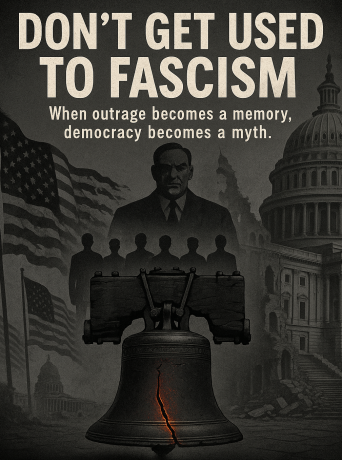When outrage becomes a memory, democracy becomes a myth.
Authoritarianism arrives quietly—drip by drip, lie by lie, until the public forgets what normal ever felt like.

Trump didn’t invent this. But no modern American figure has weaponized the slow, deliberate erosion of outrage like he has. He’s not the disease; he’s the super-spreader.
A decade ago, if you’d told Americans that a sitting president would try to overturn an election, openly praise dictators, call the free press the “enemy of the people,” pardon embezzlers and grifters, and promise to be a dictator on Day One of his second term, they’d have called you a doomsayer. “That can’t happen here,” they’d say.
And now the danger is that we’re getting used to it.
I remember being a teenager and reading They Thought They Were Free by Milton Mayer. His interviews with ten “average Germans” haunted me—not because they were monsters, but because they were so ordinary. They weren’t goose-stepping Nazis. They were bakers. Mechanics. Teachers. And they didn’t resist fascism because they didn’t see it clearly … until it was too late.
And now I see it happening here. In real time.
Not with torch – lit rallies or salutes – though we’re flirting with those too – but with endless crisis fatigue. With people so overwhelmed they stop reacting. And then stop noticing.
This is how fascism works. Not with jackboots at the gates, but with moral anesthesia. One crisis, one tweet, one “that’s just Trump being Trump” at a time.
Hannah Arendt warned us: the banality of evil isn’t in the spectacle — it’s in the shrug. The normalization.
Victor Klemperer, a scholar who chronicled the rise of Nazism, wrote of the “extraordinary capacity of human beings to become accustomed to things.” Even the unbearable. Especially the unbearable.
Sebastian Haffner, who resisted Hitler—until one day he realized he wasn’t resisting at all—said it plainly: fascism is seductive. It wraps itself in patriotism. In order. In promises to make things “great.”
Milton Mayer, an American journalist, asked ten ordinary Germans how they let fascism take root. Their answer? They didn’t see it happening. Not clearly. Not fast enough. Each step looked temporary. Each law a reaction to some “emergency.” Until one day, everything had changed and no one had noticed. The signs were there. But the people were tired. Distracted. Afraid.
Sound familiar?
The Heritage Foundation’s “Project 2025” openly outlines the kind of institutional purge that once defined banana republics is now a think tank proposal with glossy packaging and donor support.
But here’s the thing: democracy doesn’t die with a bang. It dies with silence. Being shocked is a civic virtue, not a weakness.
We must name what we see: fascism. Not “populism,” not “strongman politics,” not “Trumpism.” Fascism.
Call it what it is. And then call your representatives.
